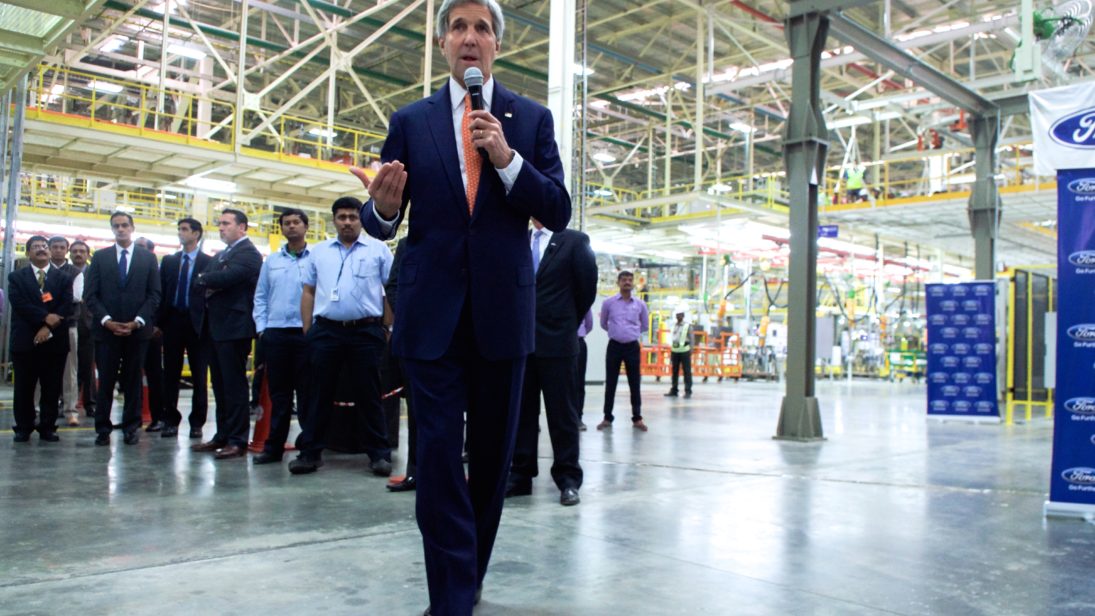
Point, Counter-Point: A Four Part Series
Between the Boots and the BJP, Waning US Influence in South Asia? by Amina Afzal
The Future Role for Washington by Tridivesh Singh Maini
Growing U.S. Role in Indo-Pak Relations by Muhammad Jawad Hashmi
India-Pakistan Relations on a One to One Basis by Reshmi Kazi
***
On August 29, 2014 India offered to resume dialogue with Pakistan within the “bilateral” framework. In the present context, the bilateral framework refers to the inclusion of Kashmiri leaders in bilateral talks. India called off foreign secretary level talks with Pakistan because of the Pakistani High Commissioner’s meeting with Kashmiri leadership. A NY Times editorial termed the decision to cancel the meeting “an overreaction on India’s part, especially when it could have served as an opportunity to discuss grievances and press for a solution.” Notwithstanding India’s objection to the inclusion of Kashmiri leadership in what it terms a “bilateral” dialogue with Pakistan, India’s demand for a bilateral dialogue also indicates its longstanding unwillingness to entertain third party mediation in times of crises. According to the Indian point of view, it is Pakistan and not India that has always tried to “internationalise the Kashmir issue, thus prompting American attempts to mediate.” In this context the future of US engagement with India is best summed up in Chuck Hagel’s recent remarks where he concedes to India’s commitment towards maintaining its independence. “No country wants to be seen as a second cousin.” He therefore urged Washington to “adjust to what India’s political requirements are, how they want to handle the relationship.” Despite several attempts by the US to woo India, many Indians remain wary of US intentions in South Asia. According to a recent commentary by Chintamani Mahapatra for the Delhi based Institute for Peace and Conflict Studies:
“There is no doubt that the election victory of the Bharatiya Janata Party under the leadership of now Indian Prime Minister Narendra Modi, with a strong popular mandate, has generated sizeable excitement in Washington. Hope of revival of the earlier impetus in the Indo-US strategic partnership has been rekindled. Obama’s invitation to Modi to visit Washington, Assistant Secretary of State Nisha Biswal Desai’s trip to India soon after the new government assumed office, visits by influential Senator John McCain and Deputy Secretary of State William J Burns to prepare the ground for the Indo-US strategic dialogue between Secretary of State John Kerry and Indian Foreign Minister Sushma Swaraj are all signals of Obama’s renewed interest in India.But Prime Minister Modi appears less animated to visit the US, more involved in constructing a peaceful neighbourhood, more focused on reviving the national economy and less enthralled to project India as a global leader.”
The Devyani Khobragade episode spawned a rift in New Delhi-Washington relations and “repairing the mind-set is not going to be easy even for the new Indian government.”
India also insists that US mediation would not be acceptable until the US takes heed of Indian security concerns vis-a-vis Pakistan. According to Gopalji Malviya and W. Lawrence S. Prabhakar, “Pakistan has gained the ability to escalate unconventional hostilities with India and then plead for international mediation to resolve the conflict. Such adventurism by Pakistan has promoted the American endeavour to propose mediation to thwart ‘a nuclear flashpoint in Kashmir.’”
In the case of Pakistan too, it is envisaged that the US influence over Pakistan after its withdrawal from Afghanistan will end automatically once the US ends its military and economic assistance. According to a Stimson Centre Report, “Some seasoned US diplomats believe that US leverage with Pakistan will decline as US forces leave Pakistan. Others suspect that the withdrawal of US forces from Afghanistan would end any semblance of US strategic partnership with Pakistan; the growing asymmetry of US ties to India and Pakistan will weaken US crisis management efforts.” The ongoing political tussle in Pakistan has further complicated the security dynamics in South Asia. According to the Wall Street Journal, the Pakistan Army has assumed control of defence and security policy pertaining to the US, India and Afghanistan.
As the political drama unfolds in Pakistan, one thing has become abundantly clear. The real power in the country rests with the Army. In case of a future crisis situation in South Asia, the outcome will also depend on the Pakistan military’s perceptions of the US role in the region. The ability of the United States to serve as “an honest broker between the parties may erode further if ties to New Delhi continue to improve while those to Islamabad— specifically, Pakistan’s military leaders—deteriorate, making the latter unreceptive to US diplomatic intervention.”
There is a need for the US to rethink its approach toward a nuclear South Asia. Rather than offering its mediation or good office at the time of crises, the United States needs to realize the importance of addressing the issues which result in these crises. From the Indian point of view it is the issue of terrorism that merits the greatest attention. In the regional context, India remains concerned about the vacuum that will be left once the US troops depart from Afghanistan and its relative impact on India. From the Pakistani perspective the US-India nuclear deal, its possible membership of the NSG and the likelihood of it acquiring an ABM system all remain factors adversely affecting the strategic balance in South Asia. Ironically, the very nuclear weapons that necessitate the involvement of a third party in South Asia have also provided the South Asian neighbours with the leverage to conduct their foreign and defence policies at will. In such a situation, the US will find it ever more difficult to deal with the two South Asian adversaries.
***